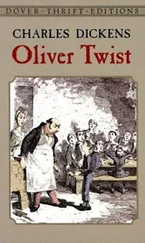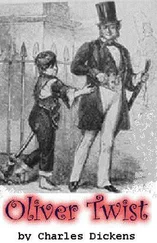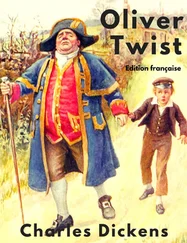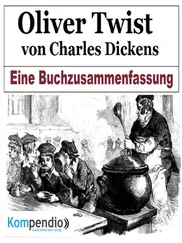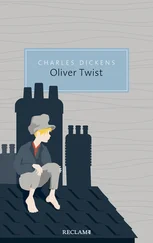Charles Dickens - Oliver Twist. Volume 3 of 3
Здесь есть возможность читать онлайн «Charles Dickens - Oliver Twist. Volume 3 of 3» — ознакомительный отрывок электронной книги совершенно бесплатно, а после прочтения отрывка купить полную версию. В некоторых случаях можно слушать аудио, скачать через торрент в формате fb2 и присутствует краткое содержание. ISBN: , Жанр: foreign_prose, на английском языке. Описание произведения, (предисловие) а так же отзывы посетителей доступны на портале библиотеки ЛибКат.
- Название:Oliver Twist. Volume 3 of 3
- Автор:
- Жанр:
- Год:неизвестен
- ISBN:http://www.gutenberg.org/ebooks/47531
- Рейтинг книги:3 / 5. Голосов: 1
-
Избранное:Добавить в избранное
- Отзывы:
-
Ваша оценка:
- 60
- 1
- 2
- 3
- 4
- 5
Oliver Twist. Volume 3 of 3: краткое содержание, описание и аннотация
Предлагаем к чтению аннотацию, описание, краткое содержание или предисловие (зависит от того, что написал сам автор книги «Oliver Twist. Volume 3 of 3»). Если вы не нашли необходимую информацию о книге — напишите в комментариях, мы постараемся отыскать её.
Oliver Twist. Volume 3 of 3 — читать онлайн ознакомительный отрывок
Ниже представлен текст книги, разбитый по страницам. Система сохранения места последней прочитанной страницы, позволяет с удобством читать онлайн бесплатно книгу «Oliver Twist. Volume 3 of 3», без необходимости каждый раз заново искать на чём Вы остановились. Поставьте закладку, и сможете в любой момент перейти на страницу, на которой закончили чтение.
Интервал:
Закладка:
“And I cannot get there in less than an hour or more,” muttered Nancy, brushing swiftly past him and gliding rapidly down the street.
Many of the shops were already closing in the back lanes and avenues through which she tracked her way in making from Spitalfields towards the West-End of London. The clock struck ten, increasing her impatience. She tore along the narrow pavement, elbowing the passengers from side to side and darting almost under the horses’ heads, crossed crowded streets, where clusters of persons were eagerly watching their opportunity to do the like.
“The woman is mad!” said the people, turning to look after her as she rushed away.
When she reached the more wealthy quarter of the town, the streets were comparatively deserted, and here her headlong progress seemed to excite a greater curiosity in the stragglers whom she hurried past. Some quickened their pace behind, as though to see whither she was hastening at such an unusual rate; and a few made head upon her, and looked back, surprised at her undiminished speed, but they fell off one by one; and when she neared her place of destination she was alone.
It was a family hotel in a quiet but handsome street near Hyde Park. As the brilliant light of the lamp which burnt before its door guided her to the spot, the clock struck eleven. She had loitered for a few paces as though irresolute, and making up her mind to advance; but the sound determined her, and she stepped into the hall. The porter’s seat was vacant. She looked round with an air of incertitude, and advanced towards the stairs.
“Now, young woman,” said a smartly-dressed female, looking out from a door behind her, “who do you want here?”
“A lady who is stopping in this house,” answered the girl.
“A lady!” was the reply, accompanied with a scornful look. “What lady, pray?”
“Miss Maylie,” said Nancy.
The young woman, who had by this time noted her appearance, replied only by a look of virtuous disdain, and summoned a man to answer her. To him Nancy repeated her request.
“What name am I to say?” asked the waiter.
“It’s of no use saying any,” replied Nancy.
“Nor business?” said the man.
“No, nor that neither,” rejoined the girl. “I must see the lady.”
“Come,” said the man, pushing her towards the door, “none of this! Take yourself off, will you?”
“I shall be carried out if I go!” said the girl violently, “and I can make that a job that two of you won’t like to do. Isn’t there any body here,” she said, looking round, “that will see a simple message carried for a poor wretch like me?”
This appeal produced an effect on a good-tempered-faced man-cook, who with some other of the servants was looking on, and who stepped forward to interfere.
“Take it up for her, Joe, can’t you?” said this person.
“What’s the good?” replied the man. “You don’t suppose the young lady will see such as her, do you?”
This allusion to Nancy’s doubtful character raised a vast quantity of chaste wrath in the bosoms of four housemaids, who remarked with great fervour that the creature was a disgrace to her sex, and strongly advocated her being thrown ruthlessly into the kennel.
“Do what you like with me,” said the girl, turning to the men again; “but do what I ask you first; and I ask you to give this message for God Almighty’s sake.”
The soft-hearted cook added his intercession, and the result was that the man who had first appeared undertook its delivery.
“What’s it to be?” said the man, with one foot on the stairs.
“That a young woman earnestly asks to speak to Miss Maylie alone,” said Nancy; “and, that if the lady will only hear the first word she has to say, she will know whether to hear her business, or have her turned out of doors as an impostor.”
“I say,” said the man, “you’re coming it strong!”
“You give the message,” said the girl firmly, “and let me hear the answer.”
The man ran up stairs, and Nancy remained pale and almost breathless, listening with quivering lip to the very audible expressions of scorn, of which the chaste housemaids were very prolific; and became still more so when the man returned, and said the young woman was to walk up stairs.
“It’s no good being proper in this world,” said the first housemaid.
“Brass can do better than the gold what has stood the fire,” said the second.
The third contented herself with wondering “what ladies was made of;” and the fourth took the first in a quartette of “Shameful!” with which the Dianas concluded.
Regardless of all this – for she had weightier matters at heart – Nancy followed the man with trembling limbs to a small antechamber, lighted by a lamp from the ceiling, in which he left her, and retired.
The girl’s life had been squandered in the streets, and the most noisome of the stews and dens of London, but there was something of the woman’s original nature left in her still; and when she heard a light step approaching the door opposite to that by which she had entered, and thought of the wide contrast which the small room would in another moment contain, she felt burdened with the sense of her own deep shame, and shrunk as though she could scarcely bear the presence of her with whom she had sought this interview.
But struggling with these better feelings was pride, – the vice of the lowest and most debased creatures no less than of the high and self-assured. The miserable companion of thieves and ruffians, the fallen outcast of low haunts, the associate of the scourings of the jails and hulks, living within the shadow of the gallows itself, – even this degraded being felt too proud to betray one feeble gleam of the womanly feeling which she thought a weakness, but which alone connected her with that humanity, of which her wasting life had obliterated all outward traces when a very child.
She raised her eyes sufficiently to observe that the figure which presented itself was that of a slight and beautiful girl, and then bending them on the ground, tossed her head with affected carelessness as she said,
“It’s a hard matter to get to see you, lady. If I had taken offence, and gone away, as many would have done, you’d have been sorry for it one day, and not without reason, either.”
“I am very sorry if any one has behaved harshly to you,” replied Rose. “Do not think of it; but tell me why you wished to see me. I am the person you inquired for.”
The kind tone of this answer, the sweet voice, the gentle manner, the absence of any accent of haughtiness or displeasure, took the girl completely by surprise, and she burst into tears.
“Oh, lady, lady!” she said, clasping her hands passionately before her face, “if there was more like you, there would be fewer like me, – there would – there would!”
“Sit down,” said Rose earnestly; “you distress me. If you are in poverty or affliction I shall be truly happy to relieve you if I can, – I shall indeed. Sit down.”
“Let me stand, lady,” said the girl, still weeping, “and do not speak to me so kindly till you know me better. It is growing late. Is – is – that door shut?”
“Yes,” said Rose, recoiling a few steps, as if to be nearer assistance in case she should require it. “Why?”
“Because,” said the girl, “I am about to put my life and the lives of others in your hands. I am the girl that dragged little Oliver back to old Fagin’s, the Jew’s, on the night he went out from the house in Pentonville.”
“You!” said Rose Maylie.
“I, lady,” replied the girl. “I am the infamous creature you have heard of, that lives among the thieves, and that never from the first moment I can recollect my eyes and senses opening on London streets have known any better life, or kinder words than they have given me, so help me God! Do not mind shrinking openly from me, lady. I am younger than you would think, to look at me, but I am well used to it; the poorest women fall back as I make my way along the crowded pavement.”
Читать дальшеИнтервал:
Закладка:
Похожие книги на «Oliver Twist. Volume 3 of 3»
Представляем Вашему вниманию похожие книги на «Oliver Twist. Volume 3 of 3» списком для выбора. Мы отобрали схожую по названию и смыслу литературу в надежде предоставить читателям больше вариантов отыскать новые, интересные, ещё непрочитанные произведения.
Обсуждение, отзывы о книге «Oliver Twist. Volume 3 of 3» и просто собственные мнения читателей. Оставьте ваши комментарии, напишите, что Вы думаете о произведении, его смысле или главных героях. Укажите что конкретно понравилось, а что нет, и почему Вы так считаете.

